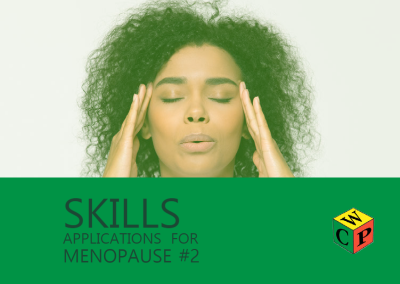As noted in the first Skills Application blog, none of the coping skills blogs specifically mention menopause. The most valuable and effective coping skills are those that can be applied across a wide spectrum of life’s issues. You, as a MM reader, are getting in on the ground floor since the skills I offer on the Menopausal Militia website are part of a larger, developing training and book project – Skills Beyond Pills © – the goal of which is to aid people in managing life’s challenges while reducing their reliance on pharmaceutical interventions.
In this Applications blog we will take a look at the last four coping skills entries: The Thought-Mind Continuum, Greatest Success / Greatest Distress, The Eight Essentials, and The Top Two Life Laws as each works to address the emotional issues of menopause including, but not limited to, irritability, sadness, anxiety, aggressiveness, fatigue, mood changes, lack of motivation and difficulty concentrating.
The Thought-Mind Continuum gives two simple to implement even on your worst days techniques that can help with and /or explain your fatigue, difficulty concentrating, irritability, anxiety and even sadness. First, taking those fifteen minutes to assess the intensity of your thought-mind can quickly offer insight into the source of your fatigue and your difficulty concentrating. If you are one of us who finds herself in the ‘my mind won’t shut up’ range it’s no wonder you can’t concentrate. The very concept of concentration is being able to hold one task or thought in your mind at a time and bring it to fruition before moving on to the next. The constant barrage of wildly random thoughts is exhausting mentally and can lead to physical fatigue as well. In addition, your EF-4 thought tornado could also blur into your sleep time leading to sleep deprivation if you cannot shut your brain down at bedtime. One simple and easy technique is to count backwards by 7’s from a large random number.
The second technique is about assessing where in the space-time continuum your thinking tends to be. Thoughts predominantly in the past can be triggering, or at least contributing to, your sadness, depression or irritability. And future-focused thinking is the primary source of anxiety. Bouncing back and forth between the two extremes can be part of your mood dysregulation. You may not be able to stop the hormonal storm behind these emotional symptoms – time and, if appropriate, some form of HRT may be needed – but addressing your thought intensity and content will help. I will go into each of these in more detail in future blogs but start with a simple daily meditation practice; or visualize putting all but one thought on a shelf or in a container; or focus on the five senses of physical experience of your present activity (Reference: Chop Wood Carry Water) are all beneficial solutions.
Greatest Success / Greatest Distress is the last installment, at least for now, in what I call the ‘being’ or self-awareness skill set. During menopause one of the first things to go, sometimes even before your period permanently leaves, is perspective. Your entire world can tilt on its axis sometime between going to bed one night and waking up the next morning. Am I right? Yeah. WTF. The challenge is to tease out whether the tilt occurred inside of you or outside of you. It is generally a pretty even mix, but the hormone storm tips the scales heavily towards it being your internal perspective that is off. In the midst of menopause you can be so emotionally hypersensitive that your perspective of life’s events becomes quite skewed and lead to being overly distressed by relatively minor events. By intentionally plotting your greatest success and greatest distress on a daily basis you can bring your pre-menopausal perspective back online and back in balance. Sometimes it is the actual events of life that throw you an emotional curve. That’s simply part of being alive. But sometimes it’s not what’s happened but how you look at it. Be sure you can tell the difference.
The Eight Essentials are a set of ‘doing’ skills and are fairly self-explanatory. You’ve moved now from assessing yourself to getting busy addressing the symptoms and issues you’ve identified. If practiced all together and consistently, I believe they are as close to a natural emotional cure-all as there is. The challenge here lies in your willingness and motivation and those are often in short supply at the height of menopause. Enlist the support of your family, friends or maybe a fellow sufferer. Remind your family that they have a vested interest in you being your best self. When others around you are engaging in healthy behaviors it is easier to do so yourself. Every emotional symptom on the list can be improved with these eight basic practices.
The Top Two Life Laws are like superpowers when you master them. Remember the childhood saying that when you point one finger at someone there are four pointing back at yourself? This is kind of like that. Particularly if you are entering menopause naturally, you are likely at an age where you are engaging in some life review thinking. The longer the perspective, the more obvious behavior patterns become. Stephen Covey said, in The Seven Habits of Highly Effective People), “seek first to understand, then to be understood”. Any time anyone who means anything to you pushes your buttons, immediately drop back and ask yourself if you have in any way given them the idea that it was OK to do so. Sometimes it’s so obvious you can’t believe you didn’t see it ages ago. But sometimes it’s sneaky and you may want to quickly exonerate yourself and heap all the blame on them. Let’s be honest, that feels soooo much better doesn’t it? But maybe, just maybe they’re doing what works for them because we taught them to. Ouch.
Remember the flames and the snowcaps in the Menopausal Militia secret emblem? Remember that you are currently bein overrun by fatigue, irritability, depression, anxiety and an overarching hypersensitivity. Don’t blow up at them or give them the cold shoulder. The best part of the top two life laws is that when the lightbulb comes on and you see the pattern it means you are now in complete control of changing the situation. Teach them to treat you differently. Make it not work for them any longer. Gently, lovingly and with compassion. But this is a ‘doing’ skill, so get busy.

